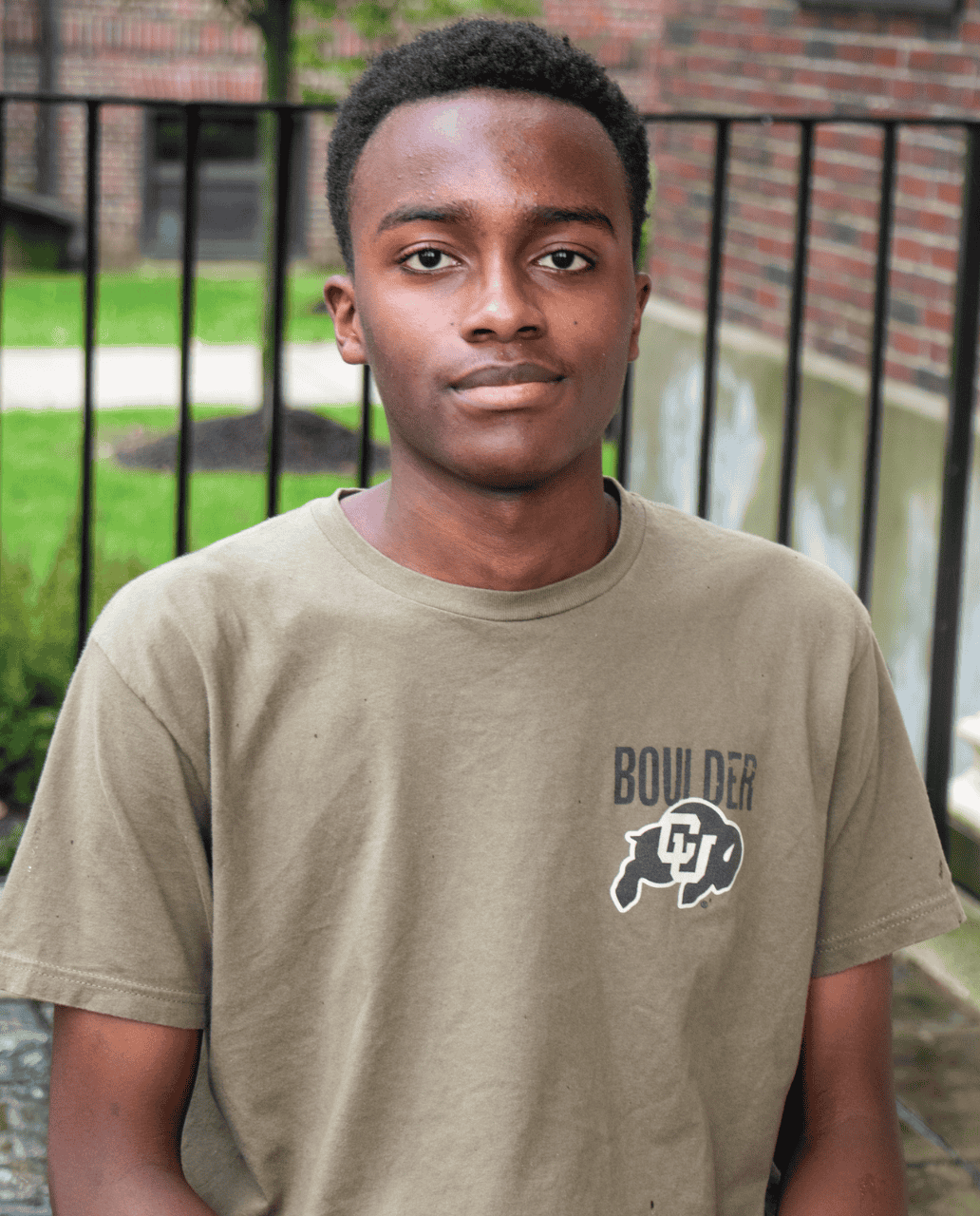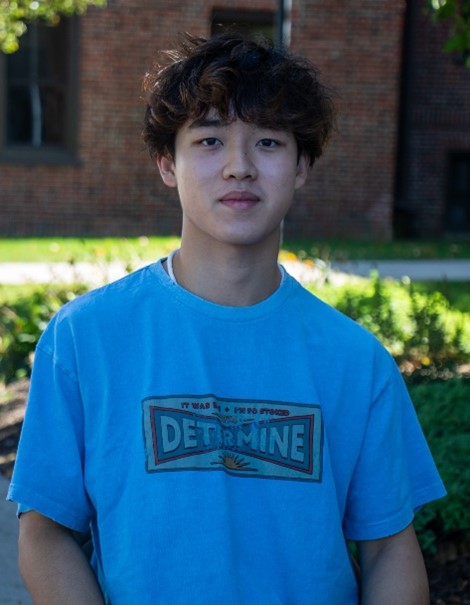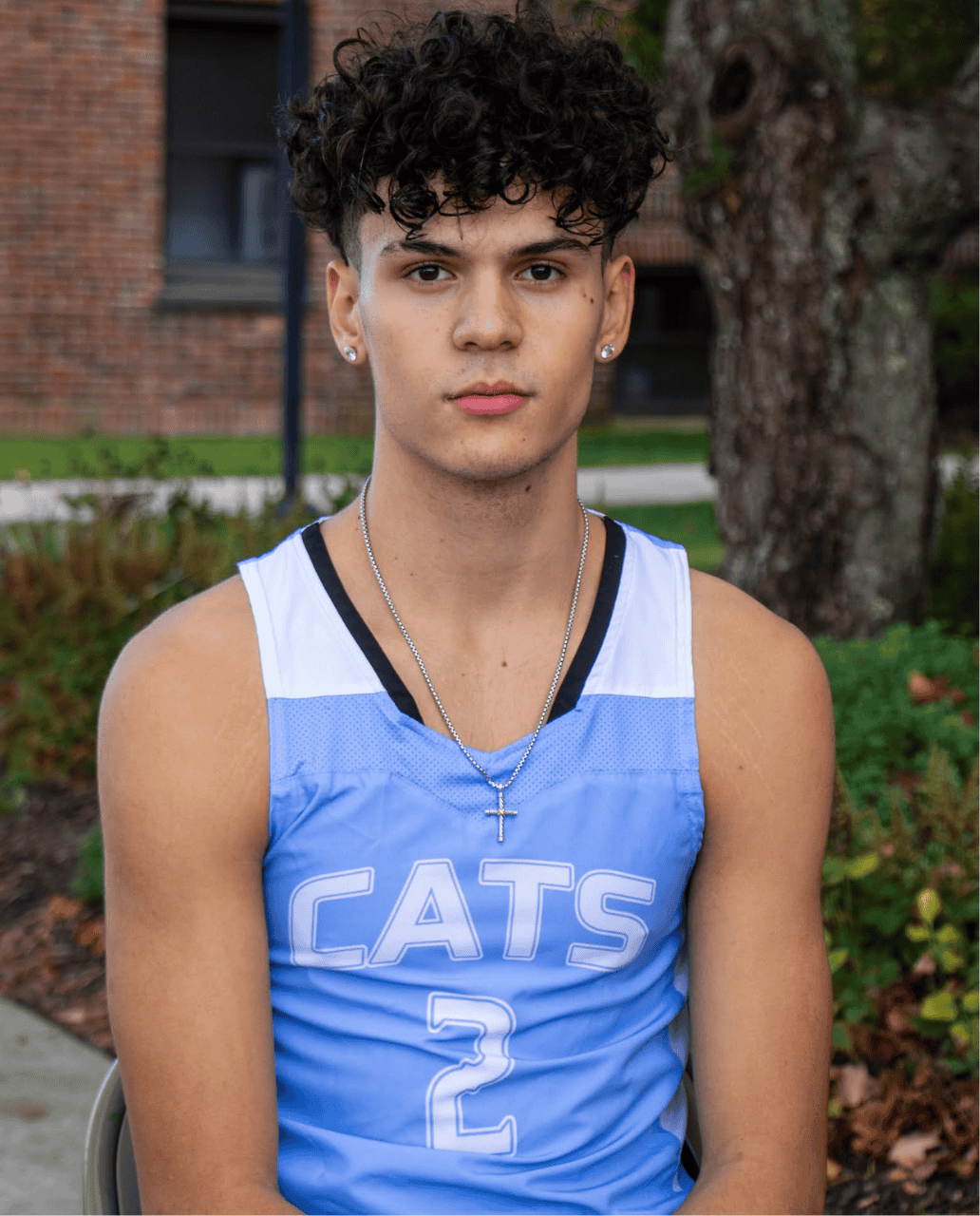The CATS Boston Science Department has several dedicated teachers, each with years of teaching experience and a wealth of content expertise, including PhDs. The Science Department uses hands-on laboratory exercises and interactive project-based learning to inspire a love of learning in their classes.
AP Biology is a one-year intensive course designed to mirror a college-level introductory biology course. Students learn a wide range of biological concepts, principles, and skills that prepare them for future learning in biology and the sciences in general. Students prepare to take the AP Biology exam at the end of the year.
The AP Biology curriculum is based on four big ideas called “enduring understandings.” These big ideas can be distilled down to evolution, energy flow, genetics and heredity, and interactions and ecology. Throughout the course, these big ideas permeate all topics and serve to connect all concepts. Students spend about 30 per cent of class time performing experiments in the laboratory (known as labs). There are 13 inquiry-based labs that are emphasized for AP Biology. These require a large amount of autonomy from students and are student-driven. These labs give students experience with everything from animal behavior and mathematical modelling to advanced biotechnology techniques and help to reinforce the four big ideas of the course. By the end of the year, students are not only equipped to perform well on the AP Biology exam but will have a very solid foundation in their biology and science education as they continue through high school and into college.
To take this elective, students require ESL Level 3 or higher, an A- or higher in CP Biology or Honors Biology at CATS Boston or another American school. Returning students will also require the recommendation of current or previous instructor. New students will need suitable placement test results.
AP Chemistry is the equivalent of a first-year college level chemistry class. This course builds on concepts developed in Chemistry or Honors Chemistry by going into greater depth and detail in such areas as chemical reaction mechanisms, chemical equilibrium, reaction rates, acid-base chemistry, and electrochemistry. Class discussions, laboratory investigations, and analytical problem-solving are emphasized throughout the course.
The laboratory portion of AP Chemistry introduces students to a variety of analytic chemistry techniques and makes use of the Vernier LabQuest Data collection system for plotting and analyzing data. All students
are required to take the AP Chemistry exam in May.
To take this elective, students require ESL Level 3 or higher, an A- or above in CP Chemistry or B+ or higher in Honors Chemistry, concurrent enrolment in Pre-Calculus or above. Returning students also need the recommendation of previous teacher. New students will need suitable placement test results.
AP Physics C: Mechanics is an Advanced Placement course taught at a college level and includes the use of calculus to study topics of physics. The level and use of calculus in this class necessitates that students have already taken a year of physics and either have completed a year of calculus or are taking calculus at the same time as Physics AP C.
This is a laboratory-based course, and students are expected to spend about a quarter of their time on
laboratory experiments. Topics that are covered in Physics AP C include kinematics; Newton’s laws of motion; work, energy, and power; systems of particles and linear momentum; circular motion and rotation; and oscillations and gravitation. By the conclusion of this course, students are able to solve mathematical, word-based, and real-life problems in physics.
To take this elective, students require ESL Level 3 or higher, A- or higher in CP Physics or B+ in Honors Physics at CATS Boston or another American school; previously completed or currently enrolled in Calculus. Returning students also need the recommendation of previous teacher. New students will need suitable placement test results.
Honors Biology is a one-year course with a hands-on, collaborative approach to projects and experiments. Topics include cellular structure and functions, genetic materials and regulation, ecosystems, energy cycles and habitat conservation, and evolution of organisms and their physiology. By the conclusion of this course, students should not only be able to understand processes of biology, but be able to think like a scientist, design experiments, and problem-solve as a group.
To take this course, students require ESL level 3 or higher. Returning students must be recommended by their previous teacher. New students need suitable placement test results.
Honors Chemistry is a challenging college-preparatory course that focuses on the physical structure of matter, its interactions through chemical reactions, and the role of energy in these interactions. Classroom discussions, group activities, demonstrations, practice in analytical problem solving, and laboratory investigations are emphasized throughout this course and students will gain a good understanding of the methods and principles of modern chemistry. Through completing this elective, you will be eligible to take AP Chemistry or Biology and the SAT II subject test in Chemistry.
To take this course, students require ESL Level 3 or higher, previous Algebra experience. Returning students will need the recommendation of previous instructor. New students need suitable placement test results.
Honors Physics is a challenging introduction to physical reasoning. In this course, students study concepts including momentum, energy, forces, simple harmonic motion, and waves, along with how these concepts are related to one another. Although these topics overlap with those in College Prep Physics, the Honors class goes at a faster pace and in greater depth, so that students take away a deeper understanding of the material.
Students also have an opportunity to research notable scientists who contributed to the development of the field and, time permitting, are introduced to ideas from relativity and quantum physics. In the laboratory component of the class, students learn about experimental design and data analysis while studying physical systems.
To take this elective, students require ESL Level 3 or higher, to have successfully completed Pre-calculus or higher. Returning students need the recommendation of previous teacher. New students must have suitable placement test results.
College Prep Biology gives a general overview of topics in Biology, as well as the practice of science in general. Through coursework, you will study classical Biology content, as well as recent developments in the field. Instructors integrate hands-on activities, seminar-style discussions, group work, and direct instruction. Topics include inquiry and the scientific method, life fundamentals and biochemistry, cell structure and function, heredity, molecular genetics, the human body and homeostasis, human reproduction and development, evolution, and ecology.
To take this elective, returning students require the recommendation of their previous teacher. New students need suitable placement test results.
This class is an introduction to Chemistry and problem-solving. Students will gain a good understanding of the methods and principles of modern Chemistry and develop strong analytical problem-solving skills. Course topics include states of matter, atomic theory, the periodicity of elements, chemical bonding, stoichiometry, intermolecular forces and physical changes in matter, gas laws, thermodynamics, kinetics and equilibrium, acids and bases, and oxidation-reduction.
To take this elective, students need ESL Level 2 or higher. Returning students require the recommendation of their previous instructor. New students must have suitable placement test results.
This class is an introductory Physics course taught at the High School level. Physics College Prep includes kinematics, forces, work, energy, power, circular motion and orbits, momentum, torque, and possibly an introduction to advanced topics as well. By the end of this course, students will be able to interpret world problems and real-life situations and make quantitative statements relating physical quantities like location, velocity, acceleration, energy, and force to each other. You will be able to exercise independent thought in carrying out and devising laboratory experiments that confirm these relationships. Skills to be learned include the ability to solve world-based problems involving physical quantities, using techniques from geometry, trigonometry and algebra, and the ability to infer from primary data in laboratory experiments various physical constants and experimental parameters. Students are assigned individual work to be completed outside of class, as well as quizzes and exams.
To take this elective, students require ESL Level 3 or higher and to have successfully completed Algebra II or higher. Returning students also must have the recommendation of their previous instructor. New students need suitable placement test results.
This course is a broad survey of science topics. During the course of the year, students look at three broad units on the fundamental concepts and vocabulary of chemistry, physics, and biology. In addition to reading conducting exercises from our textbook, students are engaged in using and developing the skills of science. These include, but are not limited to, making observations, forming questions and hypotheses, conducting experiments and research, analyzing results, and presenting conclusions in both written and oral formats.
To take this elective, students must be enrolled in ESL Level 2.
AP Biology is a one-year intensive course designed to mirror a college-level introductory biology course. Students learn a wide range of biological concepts, principles, and skills that prepare them for future learning in biology and the sciences in general. Students prepare to take the AP Biology exam at the end of the year.
The AP Biology curriculum is based on four big ideas called “enduring understandings.” These big ideas can be distilled down to evolution, energy flow, genetics and heredity, and interactions and ecology. Throughout the course, these big ideas permeate all topics and serve to connect all concepts. Students spend about 30 per cent of class time performing experiments in the laboratory (known as labs). There are 13 inquiry-based labs that are emphasized for AP Biology. These require a large amount of autonomy from students and are student-driven. These labs give students experience with everything from animal behavior and mathematical modelling to advanced biotechnology techniques and help to reinforce the four big ideas of the course. By the end of the year, students are not only equipped to perform well on the AP Biology exam but will have a very solid foundation in their biology and science education as they continue through high school and into college.
To take this elective, students require ESL Level 3 or higher, an A- or higher in CP Biology or Honors Biology at CATS Boston or another American school. Returning students will also require the recommendation of current or previous instructor. New students will need suitable placement test results.
AP Chemistry is the equivalent of a first-year college level chemistry class. This course builds on concepts developed in Chemistry or Honors Chemistry by going into greater depth and detail in such areas as chemical reaction mechanisms, chemical equilibrium, reaction rates, acid-base chemistry, and electrochemistry. Class discussions, laboratory investigations, and analytical problem-solving are emphasized throughout the course.
The laboratory portion of AP Chemistry introduces students to a variety of analytic chemistry techniques and makes use of the Vernier LabQuest Data collection system for plotting and analyzing data. All students
are required to take the AP Chemistry exam in May.
To take this elective, students require ESL Level 3 or higher, an A- or above in CP Chemistry or B+ or higher in Honors Chemistry, concurrent enrolment in Pre-Calculus or above. Returning students also need the recommendation of previous teacher. New students will need suitable placement test results.
AP Physics C: Mechanics is an Advanced Placement course taught at a college level and includes the use of calculus to study topics of physics. The level and use of calculus in this class necessitates that students have already taken a year of physics and either have completed a year of calculus or are taking calculus at the same time as Physics AP C.
This is a laboratory-based course, and students are expected to spend about a quarter of their time on
laboratory experiments. Topics that are covered in Physics AP C include kinematics; Newton’s laws of motion; work, energy, and power; systems of particles and linear momentum; circular motion and rotation; and oscillations and gravitation. By the conclusion of this course, students are able to solve mathematical, word-based, and real-life problems in physics.
To take this elective, students require ESL Level 3 or higher, A- or higher in CP Physics or B+ in Honors Physics at CATS Boston or another American school; previously completed or currently enrolled in Calculus. Returning students also need the recommendation of previous teacher. New students will need suitable placement test results.
Honors Biology is a one-year course with a hands-on, collaborative approach to projects and experiments. Topics include cellular structure and functions, genetic materials and regulation, ecosystems, energy cycles and habitat conservation, and evolution of organisms and their physiology. By the conclusion of this course, students should not only be able to understand processes of biology, but be able to think like a scientist, design experiments, and problem-solve as a group.
To take this course, students require ESL level 3 or higher. Returning students must be recommended by their previous teacher. New students need suitable placement test results.
Honors Chemistry is a challenging college-preparatory course that focuses on the physical structure of matter, its interactions through chemical reactions, and the role of energy in these interactions. Classroom discussions, group activities, demonstrations, practice in analytical problem solving, and laboratory investigations are emphasized throughout this course and students will gain a good understanding of the methods and principles of modern chemistry. Through completing this elective, you will be eligible to take AP Chemistry or Biology and the SAT II subject test in Chemistry.
To take this course, students require ESL Level 3 or higher, previous Algebra experience. Returning students will need the recommendation of previous instructor. New students need suitable placement test results.
Honors Physics is a challenging introduction to physical reasoning. In this course, students study concepts including momentum, energy, forces, simple harmonic motion, and waves, along with how these concepts are related to one another. Although these topics overlap with those in College Prep Physics, the Honors class goes at a faster pace and in greater depth, so that students take away a deeper understanding of the material.
Students also have an opportunity to research notable scientists who contributed to the development of the field and, time permitting, are introduced to ideas from relativity and quantum physics. In the laboratory component of the class, students learn about experimental design and data analysis while studying physical systems.
To take this elective, students require ESL Level 3 or higher, to have successfully completed Pre-calculus or higher. Returning students need the recommendation of previous teacher. New students must have suitable placement test results.
College Prep Biology gives a general overview of topics in Biology, as well as the practice of science in general. Through coursework, you will study classical Biology content, as well as recent developments in the field. Instructors integrate hands-on activities, seminar-style discussions, group work, and direct instruction. Topics include inquiry and the scientific method, life fundamentals and biochemistry, cell structure and function, heredity, molecular genetics, the human body and homeostasis, human reproduction and development, evolution, and ecology.
To take this elective, returning students require the recommendation of their previous teacher. New students need suitable placement test results.
This class is an introduction to Chemistry and problem-solving. Students will gain a good understanding of the methods and principles of modern Chemistry and develop strong analytical problem-solving skills. Course topics include states of matter, atomic theory, the periodicity of elements, chemical bonding, stoichiometry, intermolecular forces and physical changes in matter, gas laws, thermodynamics, kinetics and equilibrium, acids and bases, and oxidation-reduction.
To take this elective, students need ESL Level 2 or higher. Returning students require the recommendation of their previous instructor. New students must have suitable placement test results.
This class is an introductory Physics course taught at the High School level. Physics College Prep includes kinematics, forces, work, energy, power, circular motion and orbits, momentum, torque, and possibly an introduction to advanced topics as well. By the end of this course, students will be able to interpret world problems and real-life situations and make quantitative statements relating physical quantities like location, velocity, acceleration, energy, and force to each other. You will be able to exercise independent thought in carrying out and devising laboratory experiments that confirm these relationships. Skills to be learned include the ability to solve world-based problems involving physical quantities, using techniques from geometry, trigonometry and algebra, and the ability to infer from primary data in laboratory experiments various physical constants and experimental parameters. Students are assigned individual work to be completed outside of class, as well as quizzes and exams.
To take this elective, students require ESL Level 3 or higher and to have successfully completed Algebra II or higher. Returning students also must have the recommendation of their previous instructor. New students need suitable placement test results.
This anatomy and physiology course will begin with the history of dissection and human anatomy through the works of Galen, Vesalius and Da Vinci. This will give historical context and appreciation for how far the study of human anatomy has come in order to understand the body’s form and function as we do in present day. Then we will study human anatomy focusing on the muscular and skeletal systems through current resources (texts and videos etc.) and through dissections. The laboratory portion of this course will be dissection based and will begin with more simple creatures (such as mussels, squid, and worms) to explore animal Anatomy in depth and gain first-hand experience conducting scientific dissections. The year will culminate in small lab partner groups participating in the dissection of either a fetal pig or feral cat.
To take this elective, students must be enrolled in ESL Level 3.
Organic Chemistry topics include fundamental concepts of carbon-containing compounds. Topics include nomenclature, electron delocalization, resonance, stereochemistry, conformational analysis, synthesis, structure and reactivity relationships and spectroscopy. Lab skills learned include the understanding of laboratory safety, organic laboratory techniques used to separate, identify, and purify chemicals, and selected instrumental analysis. Laboratory techniques to be mastered include, but are not limited to, filtration, distillation, extraction, evaporation, recrystallization, sublimation, centrifugation, chromatography, and spectrophotometry.
To take this elective, students need to have completed Chemistry Honors with C or better and have an ESL Level of 3 or higher.
This course is a broad survey of science topics. During the course of the year, students look at three broad units on the fundamental concepts and vocabulary of chemistry, physics, and biology. In addition to reading conducting exercises from our textbook, students are engaged in using and developing the skills of science. These include, but are not limited to, making observations, forming questions and hypotheses, conducting experiments and research, analyzing results, and presenting conclusions in both written and oral formats.
To take this elective, students must be enrolled in ESL Level 2.
*Please note, course offerings are subject to change and will be offered depending on student interest.






